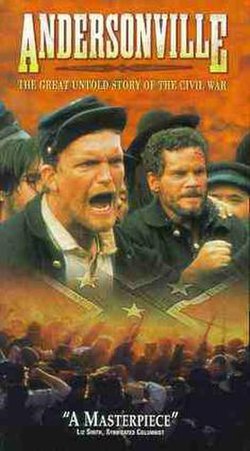Andersonville (film)
| Andersonville | |
|---|---|

Poster
|
|
| Genre | Drama History War |
| Written by | David W. Rintels |
| Directed by | John Frankenheimer |
| Starring |
Jarrod Emick Frederic Forrest Ted Marcoux |
| Music by | Gary Chang |
| Country of origin | United States |
| Original language(s) | English |
| Production | |
| Executive producer(s) |
John Frankenheimer Ethel Winant |
| Producer(s) | Diane Batson-Smith (co-producer) (as Diane Smith) David W. Rintels (producer) Lansing L. Smith (producer) |
| Cinematography | Ric Waite |
| Editor(s) | Paul Rubell |
| Running time | 167 minutes |
| Production company(s) | Turner Pictures |
| Distributor | TNT |
| Release | |
| Original network | TNT |
| Original release | March 3, 1996 |
Andersonville is a 1996 American television film directed by John Frankenheimer about a group of Union soldiers during the American Civil War who are captured by the Confederates and sent to an infamous Confederate prison camp.
The film is loosely based on the diary of John Ransom, a Union soldier imprisoned there. Although certain points of the plot are fabricated, the general conditions of the camp accurately match Ransom's descriptions, particularly references to the administration of the camp by Captain Henry Wirz. His line on escaping prisoners is very similar to the book, "The Flying Dutchman [Wirz] offers to give two at a time twelve hours the start".
The film begins with a group of Union soldiers being captured and forced to surrender at Cold Harbor, Virginia, in June 1864. They are transported to prisoner-of-war Camp Sumter, near Andersonville, Georgia. When they enter, they discover a former comrade, named Dick Potter, who explains the grim realities of daily existence in the camp – primarily the lack of shelter, clean water, and regular food supplies. He also states the danger of a rogue group of Union soldiers, called the "Raiders", who hoard the camp's meager rations, and lure unsuspecting "fresh fish" – newly captured soldiers – into their area of the camp, to attack and rob them.
With every able-bodied man required for fighting, young teenagers and old men are used as guards. At one watch tower, manned by two young guards, a Union soldier offers money for some corn. He is instructed to step over the "dead line" fence and approach the watch tower to trade, which contradicts the rules of the camp. But reluctantly, compelled by need, the soldier steps over the line, and (in a macabre type of game) the soldiers in the next watch tower shoot him dead.
As the story unfolds, the unit captured at the beginning of the film ally with some inmates, and help them by working on their tunnel under the wall. Eventually it is complete, but one man tries to inform the guards, in hope of receiving a reward. He is captured and "TT" (meaning tunnel traitor) is cut into his forehead as a warning. The escape is attempted one night, and all goes well until the last man is spotted and shot, and the dogs are unleashed. In a very short time, most escapees are back in the camp and placed in standing as punishment.
...
Wikipedia
